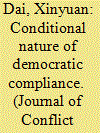| Srl | Item |
| 1 |
ID:
175853


|
|
|
|
|
| Summary/Abstract |
Witnessing power shifts among major countries in the world, scholars and policymakers alike are confronted with crucial questions about the international institutional order: Do power shifts expedite the collapse of the order? Who are its major challengers, and why? This article tackles these issues, drawing on rationalist theories of international institutions that include both realist and neoliberal thinking. I analyse how the making of the international institutional order, along with its evolution, informs us of the sources of challenges to that order. Accordingly, I explain why the country most powerful in making the international institutional order—thus the apparent beneficiary of that order—ends up nursing so many grievances against it. I illustrate this thesis in the areas of collective security, international trade, and democracy promotion. This article contributes to important debates on global governance and raises policy implications for the rewriting of international rules.
|
|
|
|
|
|
|
|
|
|
|
|
|
|
|
|
| 2 |
ID:
073762


|
|
|
|
|
| Publication |
2006.
|
| Summary/Abstract |
Do democratic institutions enhance a country's compliance with international commitments? The author develops a game-theoretic model that highlights the conditional nature of democratic institutions' effect on compliance. Rather than assuming that the electorate in a democracy benefits from compliance uniformly, the author considers domestic distributional consequences of compliance. The model thus incorporates the preferences of competing domestic constituents as well as their politically relevant attributes such as electoral leverage and informational advantage. The model shows that, although electoral institutions intensify politicians' accountability to domestic constituents, the direction of this electoral effect on compliance is determined by the political attributes of competing interests. The author illustrates this theory with examples of international economic and environmental policies.
|
|
|
|
|
|
|
|
|
|
|
|
|
|
|
|